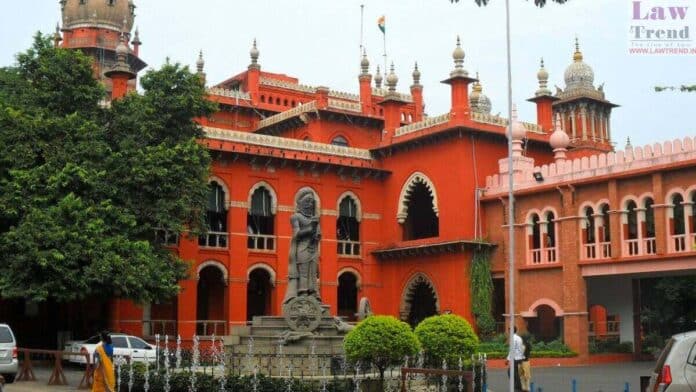The Madras High Court on Friday dimissed DMK leader RS Bharathi’s plea against former Chief Minister K Palaniswami, alleging irregularities in a highways tender running into several crores of rupees during the previous AIADMK regime.
The court declined to permit Bharathi, DMK Organising Secretary, to withdraw his petition seeking a direction to the Vigilance department to conduct a probe into the matter.
Justice N Anand Venkatesh dismissed the petition filed by Bharathi, while saying there was no reason for a fresh preliminary enquiry, as ordered by the state government after a change of regime in Tamil Nadu in 2021.
Originally, on a plea by Bharathi, the HC had ordered a CBI probe into the matter in 2018. But on a petition filed by the state government, the Supreme Court remitted the matter back to the HC to conduct a fresh hearing.
When the high court took the petition for hearing, it was submitted by the State government then that a fresh enquiry would be conducted in the matter. Following this, Bharathi wanted to withdraw his petition.
In his order, the judge said the important issue to be taken into consideration was as to what impelled the ordering of a preliminary inquiry afresh. The inquiry report was submitted on August 28, 2018. The same was accepted by the Directorate of Vigilance and Anti-Corruption (DVAC) and that was the reason why the anti-graft agency filed an appeal before the SC challenging the earlier order passed by this court.
The communications that were placed before this court do not indicate as to why a preliminary inquiry has been ordered afresh (recently). Either the DVAC should have stumbled upon some new facts/materials or the earlier preliminary inquiry report dated August 28, 2018 must be found to be bad. Without assigning any such reasons, the government straight away ordered for a preliminary inquiry afresh, the court said.
The only development that took place during the interregnum period was that there was a change in guard and the DMK won the assembly elections and formed government on May 7, 2021, the judge added.
The judge said it must be borne in mind the DVAC was an independent body belonging to the Executive Organ of the State. Hence, if at all it was not satisfied with the earlier preliminary inquiry report submitted, immediate action should have been taken by not accepting it, instead of ordering for a preliminary inquiry afresh.
The DVAC did not come to such a conclusion and in fact, it was satisfied with the preliminary inquiry report filed by the Enquiry Officer. That was the reason as to why the DVAC independently filed an appeal before the Apex Court in 2018, the judge added.
The court said without any change in the circumstances, except for a regime change in the year 2021, the government cannot now direct for a preliminary inquiry afresh by disregarding the earlier report, which was, in fact, accepted by the DVAC and the then government (headed by the AIADMK).
In the eye of law, there was only one state government and it was immaterial as to which political party takes over the power. Therefore, for all purposes, a decision taken by the government should stand and it cannot be reversed without any valid reasons, especially for a change of guard, the judge added.
He noted the common thread that could be seen in all the referred to judgments was that a decision taken should not be so easily nullified by a change of government and by some other political party assuming power. Unless it was found that the act done by the authority earlier was either contrary to statutory provisions or was unreasonable or was against public interest, the state should not change its stand merely because the other political party has come into power, the judge added.
The judge said there was no doubt in the mind of this court that the DVAC made a volte-face on account of change of government and things started moving in the year 2023.
“In none of the communications that was placed before this court, there was even a reference that the earlier preliminary inquiry report was not in conformity with law or that it was unreasonable or that some new materials have cropped up to order for a fresh inquiry. Hence, this court holds that the preliminary inquiry has been directed to be held afresh only for the reason that the other political party has come into power. The political agenda of an individual or a political party should not be subversive of the rule of law,” the judge added.
Also Read
The judge said these instances keep happening as and when there was a change in guard and ultimately, the case reaches the court. In cases of this nature, the court was like a playground where the ruling and opposition parties try to score a point for their own political games.
Ultimately, the order passed by the court will only become a subject matter of talk show in the television channels, which will be discussed with a lot of hue and cry where the participants will scream at the top of their voice supporting one party or the other and ultimately, it will all get consigned to nothing, the judge added.
“In the light of the above discussions, this court holds that the preliminary inquiry report, which was submitted by the Additional Superintendent of Police, Special Investigation Cell, Vigilance and Anti-Corruption, on August 28, 2018 and which was acted upon, does not suffer from any apparent illegality or unreasonableness in reaching the conclusion regarding every allegation that was made against the second respondent (Palaniswami).”
“Further, there is no reason for conducting another preliminary inquiry afresh as was ordered by the government. In the considered view of this court, such a direction has been given only due to change in the political party that has come into power.”




